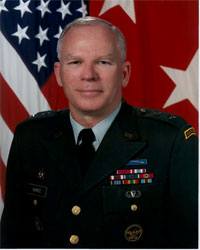Major General
Willie B. Nance Jr.
 Nance entered
the Army in 1968 as a member of the Mississippi All-Volunteer Company, a group of 200 Mississippi volunteers
who enlisted at the same time under an Army volunteer enlistment campaign. He was recruited directly from
Basic Training and Advanced Individual Training into the Infantry Officer Candidate School at Ft Benning,
GA, graduating as an honor graduate in 1969.
Nance entered
the Army in 1968 as a member of the Mississippi All-Volunteer Company, a group of 200 Mississippi volunteers
who enlisted at the same time under an Army volunteer enlistment campaign. He was recruited directly from
Basic Training and Advanced Individual Training into the Infantry Officer Candidate School at Ft Benning,
GA, graduating as an honor graduate in 1969.
Originally commissioned into the Infantry, Nance was sent to the University of Southern Mississippi under the Army's Boot-Strap program and graduated with the Southern Mississippi class of 1980 with Highest Honors. In early 1980, Nance was assigned to Redstone Arsenal, AL, where he joined the Logistics division of the TOW/Dragon Project Office. He was eventually assigned as Assistant Project Manager for Readiness and was responsible for managing the development and integration of the TOW into the Bradley Fighting Vehicle.
It was during this assignment that Nance branch transferred to the Ordnance Corps. In the summer of 1982, Nance was selected to be a member of the initial cadre of a new Department of the Army Research and Development Command, Europe office.
After completing Command and General Staff College in 1985, Nance was assigned as a Department of the Army Staff Coordinator for Anti-Armor Systems in the office of Deputy Chief of Staff for Research, Development, and Acquisition. He was selected for the position of Product Manager for Bradley Fighting Vehicle TOW - 2 Subsystem and was responsible for developing, integrating, and fielding the TOW-2 capability into the Bradley Fighting Vehicle.
When promoted to Colonel, he managed both the Army Tactical Missile System and the Brilliant Anti-Tank Submunition programs and was selected as the 1994 Secretary of the Army Project Manager of the Year.
In his first assignment as a General, Nance served from 1995 to 1996 as the Deputy Commander of the US Army Space and Strategic Defense Command. From 1996 to 1998, Nance served as the Army's Program Executive Officer for Tactical Missiles. In 1998, Nance undertook perhaps his most challenging professional task when he became Program Director and Program Executive Officer for National Missile Defense.
In 2001, the Bush administration undertook a strategic review that opened the door to more capable missile defenses, and Nance helped lead an intensive effort to develop and evaluate new approaches to defending the United States against missile attack. Nance's leadership of the National Missile Defense Program was recognized by his selection as a co-recipient, along with his industry counterpart, for the 2002 Multinational Ballistic Missile Defense Conference's David R. Israel Award for Meritorious Achievement.
Maj. Gen. Willie B. Nance, Jr., retired from active duty on 1 November 2002 after thirty four plus years of service to our Nation.
In 2004 Nance was asked to participate as a member of an Independent Review Panel along with Dr. William Graham, former National Science Advisor to President Reagan, and Dr. William Balhaus, Chief Executive Officer of the Aerospace Corporation, to investigate recent Ballistic Missile Defense flight test failures. Recommendations provided by the panel were implemented across all Ballistic Missile Defense Programs to improve system engineering processes, mission assurance practices, flight test readiness, and fielding and operational support. MG Nance continues to serve by participating in Senior Advisory Groups and Panels that assist and advise in the areas of tactical missiles, air defense, missile defense, and space.